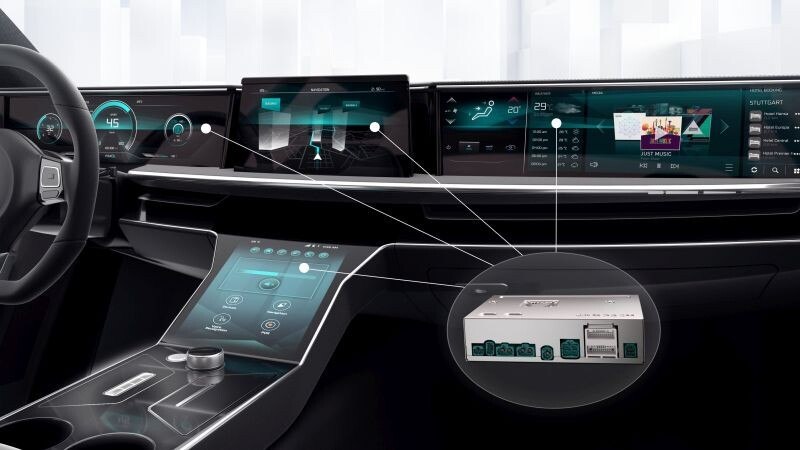Future market for vehicle computers: Bosch receives orders worth billions
Cars are becoming more and more intelligent, and in the future no vehicle will be able to function without high-performance control units. There is enormous business potential in this, a billion-dollar market in which Bosch is already actively involved.

Future market for vehicle computers: Bosch receives orders worth billions

More intelligence in the car: Bosch ensures this with vehicle computers. They are the new all-rounders in vehicle electronics and are bundling more and more functions of individual control devices in central, particularly powerful electronic modules. Bosch vehicle computers have been controlling driver assistance systems and vehicle movement in series vehicles since 2019. Central computers for cockpit functions and body electronics will soon be added. This means that the technology and service company is broadly positioned when it comes to vehicle computers; the Germans offer them ready for series production for all areas of modern vehicles. This also pays off economically: Bosch has now received orders worth several billion euros for its vehicle computers; There have been around 2.5 billion since the summer of 2020 alone.
"Vehicle computers hold enormous business potential for Bosch. We are already one of the leading development and technology partners for automobile manufacturers with high-performance computers," says Harald Kröger, Managing Director of Robert Bosch GmbH. The vehicle computers are a central component with which Bosch wants to expand its leading role in software-intensive electronic systems. This market is worth around 20 billion euros and will grow by up to 15 percent annually until 2030. The new Cross-Domain Computing Solutions division will begin work in January 2021 with a total of 17,000 employees. In the unit, Bosch brings together both hardware and software development for vehicle computers, sensors and control devices for all vehicle areas.
Vehicle electronics are becoming fit for the future
In the future, no car will be able to function without high-performance control units. All of a car’s nerve fibers come together in the central junctions. Thanks to enormous computing power of several billion operations per second, the central computers themselves process large amounts of data, such as those required for automated driving, data-based services and permanent software updates. According to the consulting firm McKinsey, software will account for around 30 percent of a vehicle's value in the future; today it is only ten percent. This development shows the importance that bits and bytes will have for vehicles in the future. Vehicle computers that handle this level of software and data will soon be standard in all vehicles - from small cars to luxury cars up to 40 ton trucks. Bosch develops them for cockpit and networking functions, driver assistance systems and automated driving as well as the drive and body electronics. This means that all central vehicle functions can be brought together on a handful of powerful central computers. An example: Bosch's central cockpit computer will take over the tasks of up to ten control units in the next generation of vehicles. As a result, automobile manufacturers can significantly reduce the number of control units, some of which have more than 100. “Vehicle computers are the key to reducing the complexity of electronic systems and making them as safe as possible,” says Kröger. If more central high-performance computers are installed in the future, this will also save cable length - and thus costs, weight and installation space.
Spearhead of vehicle electronics
In the next few years, tasks from different areas of the vehicle – experts refer to them as domains – will also be merged in vehicle computers. In addition to the vehicle movement, you then also control the body electronics, for example, in just one central computer. These are then even more powerful: In the last 20 years, the computing power of a control unit that was once used for navigation has increased by a factor of 3,000. Compared to Moore's Law, which assumes that computing power doubles every two years, this increase is around three times as large. In addition to displays, infotainment and voice control, a cockpit computer can also control tasks in other areas of the vehicle, such as certain assistance functions. “Bosch vehicle computers make it possible to control even highly complex driving functions that go beyond individual vehicle domains,” says Dr. Mathias Pillin from Bosch. From January 2021, he will take over as chairman of the divisional board of the new Cross-Domain Computing Solutions division. By the way, the area doesn't get its name by chance. Translated, it means cross-domain computer solutions. Here the company bundles its forces in software, electrical and electronic development in the areas of driver assistance and automated driving, car multimedia as well as drive and body electronics under one roof.
Modular logic has business potential
Bosch offers its vehicle computers in a scalable modular system that contains the right electronic system of hardware and software for all requirements and requirements. The goal is a software and system architecture for the entire vehicle in which all central computers, sensors and control devices fit together like a modular system and build on one another. Car manufacturers benefit from this because the modular logic makes the development of vehicle computers for different vehicle models particularly flexible. For example, if a basic architecture of hardware and software is specified, it can be adapted according to a defined system depending on the customer project. For premium vehicles, additional software components or special chips are added to the circuit boards to enable more functions. In small cars, however, the structure of the vehicle computers can be adapted so that they centrally cover important safety-relevant basic functions. “With the modular logic for vehicle computers and our broad range, Bosch can respond to all the needs of car manufacturers,” says Pillin. Thanks to the modular principle, the high-performance computers also have enormous business potential, as Bosch can tap into a large market with them.

 Suche
Suche
 Mein Konto
Mein Konto